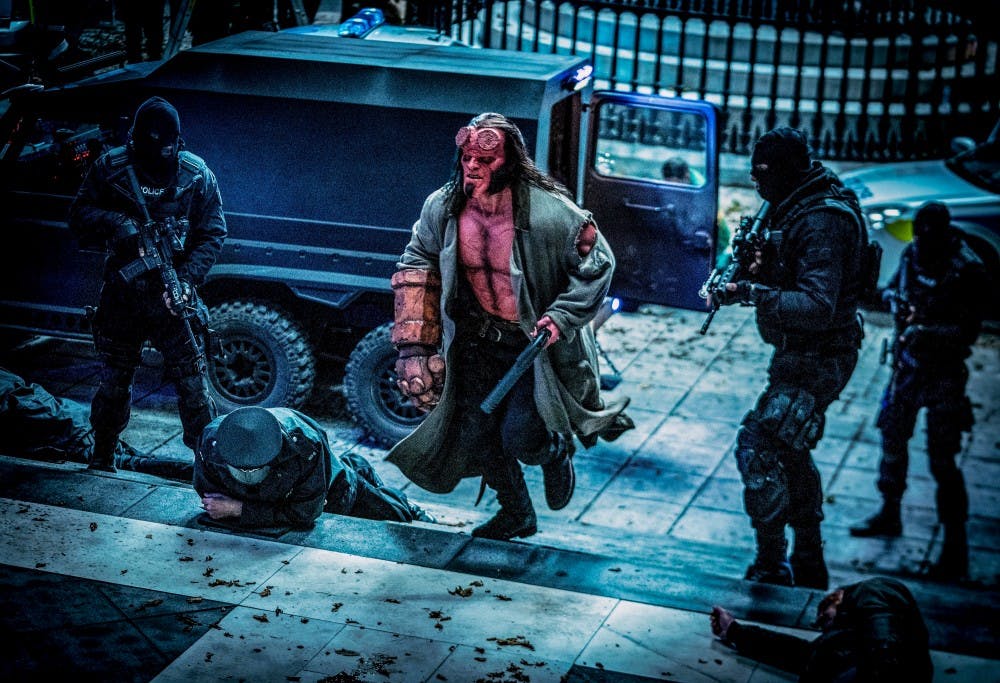From its opening scene, it was clear that “Hellboy” was going to be a bloody, gore-riddled mess. Neil Marshall’s “Hellboy,” a reboot of Guillermo del Toro’s beloved two installments “Hellboy” and “The Golden Army,” invests the majority of its time (and apparently its budget) on gore rather than compelling storytelling. The visual splendor and extensive world building of del Toro is sacrificed for the sake of an R-rating.
Marshall’s reboot begins with an opening struggle between King Arthur and the British sorceress, Nimue, the Queen of Blood (Milla Jovovich). Nimue is defeated by King Arthur and his sword, Excalibur, and her dismembered limbs are sent out to the most isolated corners of the British Isles.
Fast forward to present day and we find Hellboy (David Harbour) sulking in shady bars and processing his relationship with his father. Hellboy attributes most of his angst to his father (Ian McShane), who had an unorthodox approach to raising his son. The potential to explore a universal misunderstanding between a father and son is immediately ignored in favor of two hours of derivative violence that leads to a climax that only further indulges in cheap violence.
The gore on display is fun, but not impressive by any means. The practical effect driven vision of del Toro is sadly missed in this CGI driven world. The supernatural creatures are aggressively CGI and most would be at home in the early 2000s. Marshall’s vision, except for a few entertaining moments, is akin to Uwe Boll’s infamously bad, “BloodRayne.”
Despite a rigid and unimaginative script, Harbour gives a commendable performance as Hellboy. His muffled, nonchalant responses in absurd situations is genuinely enjoyable. Yet, Harbour’s natural charisma and charm are not enough to overcome a script that fails the beloved character.
Marshall’s interpretation of Hellboy is one dimensional. Hellboy is occasionally funny with a gruff delivery for humor. The potentially complex relationship he has with his dad is never developed. Hellboy is instead a vehicle for action and carnage.
Like the rest of the movie, it is difficult not to notice its production value. Harbour’s Hellboy is hidden beneath a rigid shell of prosthetics. Harbour manages to convey emotion through his voice, but the audience is left desiring a more physical performance. Ron Perlman’s Hellboy was believable and expressive. The makeup was minimal and it was easy to see Perlman’s natural reactions under his makeup.
It is inevitable that any reboot will be compared to its original. Marshall’s “Hellboy” was destined to pale in comparison to del Toro’s two brilliant “Hellboy” movies. Del Toro’s first “Hellboy” was an absolutely solid, albeit, safe entry into the universe. It was grungy and boasted Ron Perlman enjoying every minute playing the beloved character.
Del Toro’s sequel to “Hellboy,” “The Golden Army,” should really be considered more of a fantasy than a superhero film. The world that del Toro plunged Hellboy into was occupied by living and evolving characters. It was a society that rivaled the one that we occupy. Del Toro’s two “Hellboy" movies were ambitious, imaginative and, above all, emphasized developing compelling characters over action.
Marshall’s “Hellboy” is a grim and shallow redirection of a character that questions humanity’s tolerance to diversity. Del Toro sought to celebrate the diversity of Hellboy’s universe. The supernatural creatures were complex and relatable. “Hellboy,” offers nothing more than a display of underwhelming CGI and a thinly written script.
Justin Schatz is a freelance reporter and photographer for the Daily Lobo. He can be contacted by email at culture@dailylobo.com or on Twitter @JustinSchatz10.
Get content from The Daily Lobo delivered to your inbox






